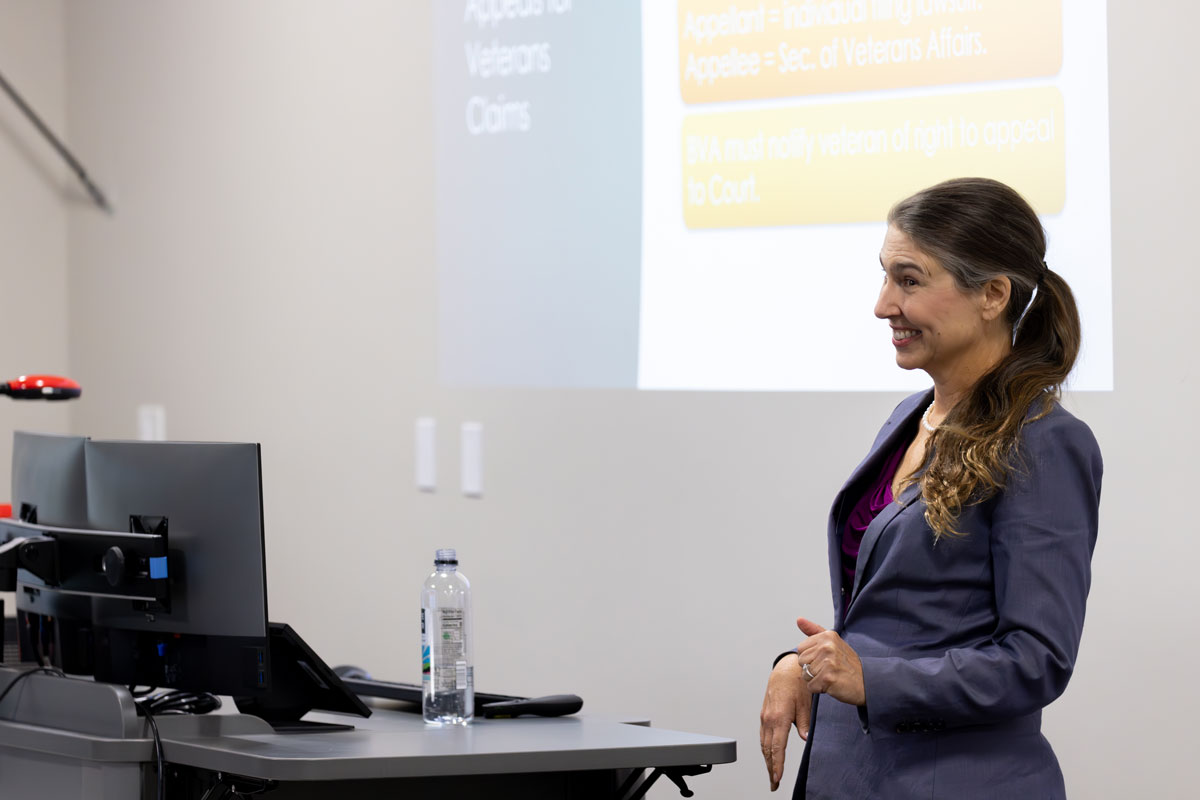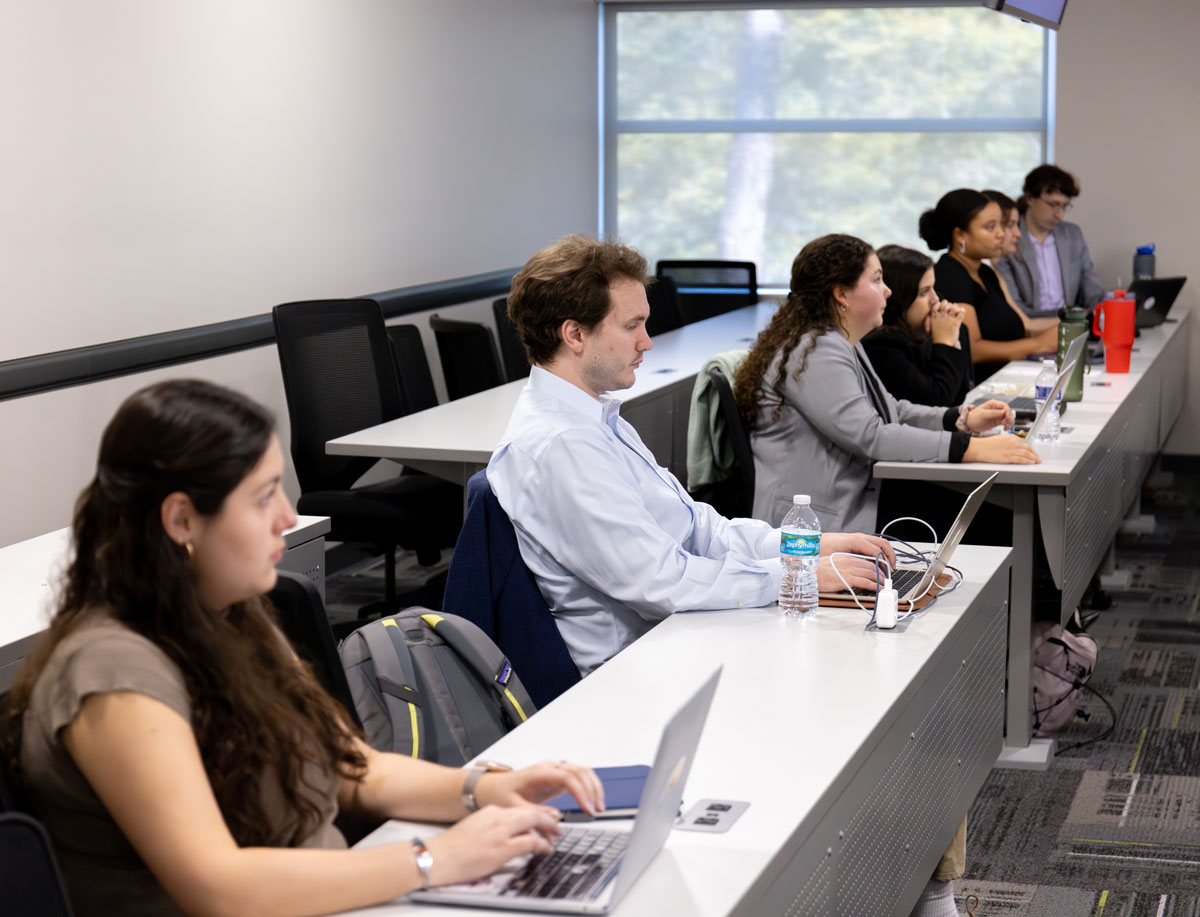UF law students provide legal assistance for veterans

UF Veterans Legal Clinic
More than 30 years after fighting in the Gulf War, U.S. Marine Raymond Czyzewski continues to experience debilitating symptoms from exposure to burn pits and inhaling oil field smoke.
Czyzewski appealed to the U.S. Court of Appeals for Veterans Claims after the Department of Veterans Affairs (VA) rated him only 50% disabled, denying that the injuries and illnesses he experienced were linked to his time in the service.
The Veterans Consortium Pro Bono Program in Washington, D.C. assigned his appeal to the UF Veterans and Servicemembers Legal Clinic – a Levin College of Law program (part of the Virgil D. Hawkins Civil Legal Clinics) where students work under faculty to provide free legal help for veterans. Due to the work of the clinic students and staff, the appeals court ruled that the VA was wrong to deny Czyzewski the disability compensation benefits he earned and deserved.
To prepare the appeal, UF law students interviewed Czyzewski to understand his deployment to the Gulf and the resulting health conditions. They reviewed the thousands of pages of medical and service details in his VA record, as well as the VA claims and treatment records, in order to identify errors in the Board of Veterans’ Appeals decision. Next, students researched federal statutes, regulations, and case law to draft a legal memorandum that identified prejudicial board errors. Their brief convinced the opposing counsel – an attorney from the VA Office of General Counsel – to consider a do-over, known as a remand, before the VA.
The remand allowed Czyzewski to present more evidence and new arguments to the board. Students worked with Czyzewski and medical experts to develop lay and expert evidence illustrating that his disability rating should be higher, and the VA increased it to 80%, acknowledging that many of his conditions were connected to his deployment.
As a result, Czyzewski successfully recovered tens of thousands of dollars of retroactive disability compensation benefits. Moreover, the students’ work ensured that, in the future, Czyzewski will receive a higher amount of monthly disability compensation benefits due to the disabling nature of his conditions. Czyzewski, who resides in Merritt Island, Florida, credits his improved quality of life to the clinic’s legal assistance for veterans and its hard-working students.
“To have someone fight on my behalf meant the world to me,” Czyzewski said. “My health has changed for the better and, with more financial security, I’m able to provide for my family.”

UF Veterans Legal Clinic
Changing lives
The staff at the Veterans and Servicemembers Legal Clinic at UF is committed to helping students make an impact. Clinic director Judy Clausen, J.D., a UF Law alum and U.S. Army veteran, serves as a legal skills professor and supervising attorney. Clausen is also the president of the Board of Directors for the National Law School Veterans Clinic Consortium and the co-chair of its Policy Advocacy Committee. Lindsay Hanson, a staff attorney for all of UF’s legal clinics, provides support and teaches students about legal practice management.
On behalf of the Consortium, and with preparation help from her students, Clausen has testified in Washington, D.C. before the House Committee on Veterans' Affairs Subcommittee on Economic Opportunity about the work of veterans clinics at law schools across the country.
“My students and clients inspire me every day,” Clausen said. “It is thrilling to share client victories with students who experience how their hard work and legal skills can positively impact clients’ lives.”
Czyzewski’s example is just one of the 2019-founded clinic’s many victories. Of the nearly 40 cases that students have handled before the Veterans Court, 97% have resulted in successful outcomes, and students have earned a remand victory for the client in almost every case. More broadly, the clinic has provided legal services to 50 veterans and servicemembers and their families.
Due to the clinic’s work, clients have obtained approximately $2 million in wrongfully denied retroactive disability compensation benefits and approximately $6 million in estimated prospective future compensation benefits (future benefits are estimated based on average life expectancy).
In another case, students provided legal assistance for one veteran with blindness and amputations. This veteran, with a 100% disability rating, received the highest level of special monthly compensation, as well as a car allowance, a fully-funded home nurse, and VA alterations of his home to accommodate his disabilities.
Students’ legal assistance for veterans has also helped clients secure access to healthcare. The clinic has recovered approximately $170,000 in attorney’s fees from the federal government under the Equal Access to Justice Act. The clinic uses these funds to pay for medical expert opinions and other client expenses, which help veterans illustrate to the VA that their injuries and illnesses are connected to their service and warrant disability compensation.
Clinic clients have included servicemembers from nearly all branches of the military over multiple generations – from Vietnam War veterans to those who served in the War in Afghanistan.
Building careers
The clinic accepts nine law students each semester (119 have participated so far) and prioritizes career-focused, experiential learning. Other students accept pro bono projects from the clinic.
Before participating in the clinic in the fall of 2022, Sarah Long wasn’t sure what her plan would be after law school. Her clinic experience led her to pursue a career in veterans law, and she now works as an appellate attorney for the court of appeals litigation group at the VA Office of General Counsel in Washington, D.C.
“Working for the veterans was so rewarding,” Long said. “What started off as a good way to gain experience ended up carving out my future.”
By participating in the National Law School Veterans Clinic Consortium, UF clinic students are able to join peers from other law school clinics to draft petitions for VA rulemaking and comment on proposed VA rules. The VA is legally required to consider these petitions and comments when enacting regulations that shape veterans’ access to benefits.
UF students have collaborated with students from other law school clinics to draft three amicus briefs before the U.S. Supreme Court, as well as three briefs before the U.S. Court of Appeals for the Federal Circuit.
Students also work to obtain discharge upgrades for veterans who were not honorably discharged due to misconduct. This work changes veterans’ lives because it removes the stigma of adverse discharges and barriers to employment, while opening up access to VA benefits. In a typical case, a veteran’s misconduct is often connected to in-service trauma or post-traumatic stress disorder; this may lead veterans to self-medicate with drugs or alcohol, or commit nonviolent offenses such as absence from duty without leave.
In these cases, students interview the veteran and material witnesses, collaborate with medical experts to help create reports, and draft legal briefs before the military branch’s Board for Correction of Military Records and Defense Review Board. Legal assistance for veterans also includes working to upgrade the discharges of veterans who were discharged adversely under the “Don't ask, don't tell” policy and other prior discriminatory policies. Students have upgraded discharges for six clients, all of whom were referred by The Veterans Consortium, a national organization that assists veterans with legal services.
In February 2021, the clinic received the American Bar Association Military Pro Bono Project Outstanding Services Award for providing pro bono legal services to military personnel and family members (more specifically, providing free legal help when aiding an active-duty sailor and his family with a guardianship matter). Students also prepare research papers concerning consumer protection and family law matters for Navy judge advocates, which helps military lawyers provide legal assistance to sailors and Marines.
Ebony Love speaks highly of her experience working in the clinic. She joined the U.S. Navy following her law school graduation in 2021 and currently serves as a Navy judge advocate.
“Helping bridge the knowledge gap for these individuals who have served our country is so important,” Love said. “At the clinic, I was able to help those who couldn’t advocate for themselves.”
Students give back to the local community as well. They deliver Know Your Rights presentations at UF to cadets in the Reserve Officers' Training Corps program, and they visit the HONOR Center in Alachua County to speak to those struggling with homelessness.
Several clinic students have made careers out of providing legal assistance for veterans and servicemembers. They work as judge advocates, attorneys in private law firms who handle pro bono projects, legal aid attorneys, lawyers for nonprofit organizations, and civilian federal and state government attorneys.
“Our students make the veterans feel heard,” Clausen said. “And I am grateful for the privilege of helping them hone their skills so that they continue to serve our nation’s veterans and military personnel.”
